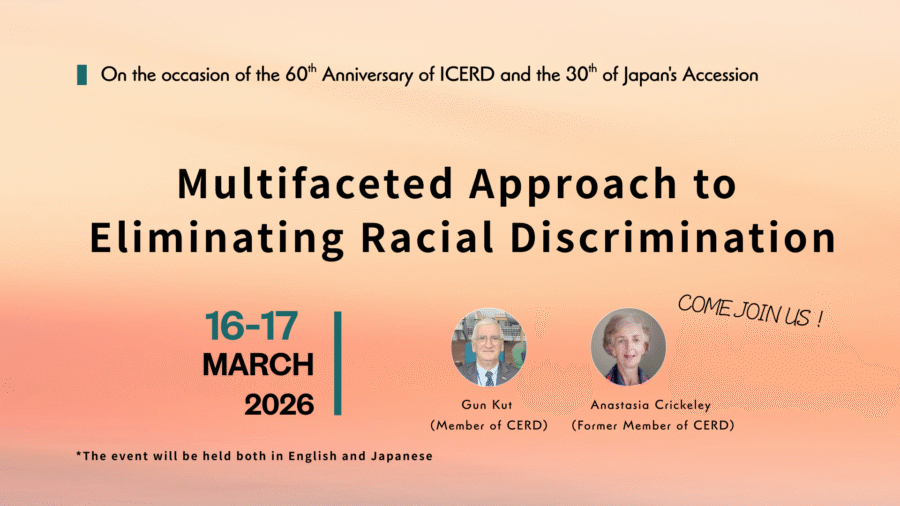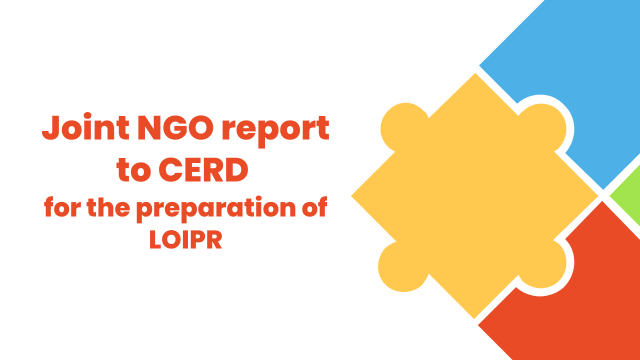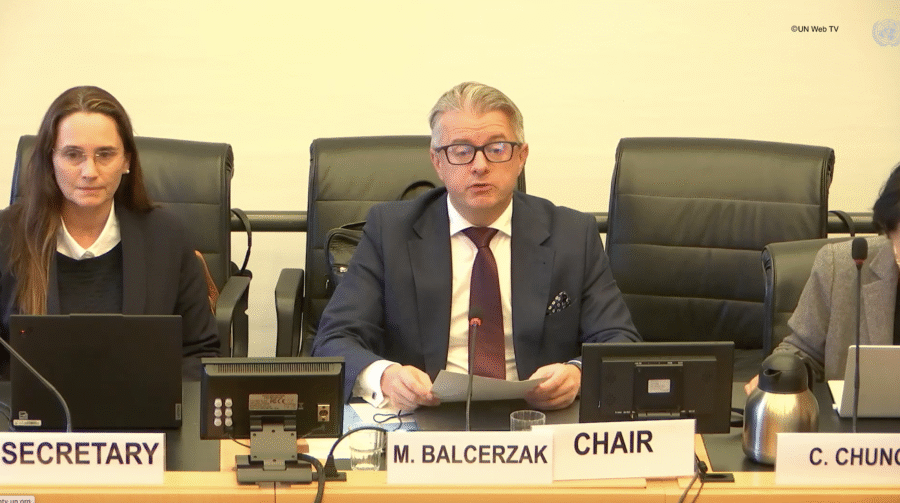Truth, justice, reparation and guarantees of non-recurrence in Sri Lanka (HRC30, 2015, WS)
September 23, 2015
IMADR submitted a written statement on “The need for truth, justice, reparation and guarantees of non-recurrence in Sri Lanka as a matter of fundamental and basic rights” at the 30th session of the Human Rights Council. Whole text can be read below or downloaded here. ![]()
———
The need for truth, justice, reparation and guarantees of non-recurrence in Sri Lanka as a matter of fundamental and basic rights
In order to reach long-lasting peace and reconciliation in Sri Lanka, it is of a vital importance that the Government guarantees an end to the culture of impunity that has characterized previous governments and put in place comprehensive policies with due respect for human rights, rule of law, accountability and international obligations the Government of Sri Lanka (GOSL) is bound by[1].
Sri Lanka is required under its international legal obligations[2] to address the legacies of massive past violations occurred during the civil war ended in 2009, as well as the post-conflict and ongoing abuses, especially in the areas of enforced disappearances, extrajudicial executions, sexual and gender based violence, torture, attacks on religious minorities and places, surveillance, suppression of dissent and threats to human rights defenders. The obligations of the GOSL towards its citizens include the right to the full truth about the violations; to the investigation, prosecution, and punishment of those responsible; to the effective and equitable reparation; and to measures that seek to prevent the recurrence of such violations in the future[3].
In March 2015, the new Government of Sri Lanka (GOSL) declared its political will to fulfil human rights objectives and work on achieving reconciliation to “unite the minds of the people of all ethnic and religious communities in the country”[4]. However, it has taken no concrete action on accountability for alleged war crimes and crimes against humanity nor has it cooperated with the UN Human Rights Council mandated investigation into war crimes, promoting as an alternative a purely domestic mechanism.
Commissions of inquiry and promise for a credible domestic mechanism
The numerous commissions of inquiry for mass violations established since the end of the conflict have been strongly criticised by the civil society as well as by the international community[5]. They have been undermined by their lack of independence and capacity and their recommendations have been inadequately or not implemented.
Recognizing that the previous governments failed to meet international standards on transitional justice, the new GOSL has declared that it will establish a domestic mechanism to undertake a comprehensive investigation into alleged serious violations and abuses of human rights as well as implement other building measures in terms of transitional justice and reconciliation[6].
However, as of today, the Government has not taken any concrete measures aimed at establishing a credible justice and accountability process in the country. The first imperative step towards ensuring the legitimacy of any such mechanism is to conduct meaningful and non-selective public consultations with the civil society and those affected by abuses, including organisations in the North and East of Sri Lanka. At present, there are no signs that the GOSL has planned such a consultation. Additionally, war crimes, crimes against humanity and genocide are still not recognized by the Sri Lankan national laws and the GOSL has not ratified the International Convention for the Protection of All Persons from Enforced Disappearances[7] and the Optional Protocol to the Convention Against Torture[8]. Finally, the Prevention of Terrorism Act of 1978, which provides immunity for security officers, has not been repealed.
The need for a credible mechanism established by the GOSL and the UN
The current situation shows a lack of demonstrable progress with regard to the Government’s own pledges and increased mistrust in the Government’s determination to genuinely redress legacies of human rights abuses[9]. The lack of political will and capacity, the political interference and the chronic failure of previous domestic measures underline the need for the creation of a mechanism co-established by the Government of Sri Lanka and the United Nations (UN)[10].
The credibility of any mechanism of transitional justice will depend on the collaboration between the GOSL and the UN, on its design and its operations. The operations need to be conducted in line with international standards and best practice. With this aim, international prosecutors and judges have to be able to share their expertise, notably on forensics, witness protection, victim care and reparations. It is important to note that such a mechanism has to be established taking into account the findings and recommendations of the relevant processes undertaken with Sri Lankan participation such as the Lessons Learnt and Reconciliation Commission (LLRC), as well as UN processes including the Office of the High Commissioner for Human Rights Investigation on Sri Lanka. Moreover, the civil society should be consulted in the design of effective transitional justice measures, such as public acknowledgment by state and non-state actors, reparations, truth telling and memorialisation.
Lastly, in order to truly redress human rights violations, it is imperative for the GOSL to clarify as soon as possible the fate of those who have disappeared in Sri Lanka. Thousands of people are still missing, which presents a source of great distress for families generating rights violations on their own[11]. A credible, independent and comprehensive mechanism to address the issue of missing persons needs to be established to bring justice and closure to the families.
Conclusion
The GOSL need to ensure that the notion of human rights is at the core of long-term comprehensive measures designed to redress violations and abuses that occurred during and after the conflict in Sri Lanka. The recent attacks on religious minorities and unjustified surveillance of the civil society and victims are particularly alarming[12]. In order to guarantee the non-repetition of human rights violations and to ensure accountability for past and ongoing abuses, the GOSL has the requirement to shortly put in place criminal prosecutions, truth commissions and reparations programs as well as to implement institutional reforms.
Recommendations
We call upon the Government of Sri Lanka to:
- Incorporate war crimes, crimes against humanity and genocide into Sri Lankan law;
- Establish specialized trial and appellate chambers, comprising of local and international judges, to try international crimes and human rights violations amounting to crimes;
- Establish independent special prosecutor’s office, comprising of local and international prosecutors, to deal with international crimes and human rights abuses;
- Establish Independent Office for Missing Persons and victims of enforced disappearances;
- Ratify of the Rome Statute of the International Criminal Court by the Government of Sri Lanka and the introduction of enabling domestic legislation;
- Ratify of the International Convention for the Protection of All Persons from Enforced Disappearances and the Optional Protocol to the Convention Against Torture and the introduction of enabling domestic legislation;
- Repeal the Prevention of Terrorism Act (PTA);
- Establish other approaches to transitional justice including reparations, truth telling, vetting of public officials, memorialisation and institutional reform, ensuring victim centeredness, and the need to engage with affected men and women from different communities from across Sri Lanka;
- Reform the victim and witness protection legislation in Sri Lanka and establish effective protection mechanisms.
We call upon the Human Rights Council and its Member States to:
- Exercise universal jurisdiction, passive personality jurisdiction and nationality jurisdiction in relation to international crimes committed in Sri Lanka;
- Establish an OHCHR field office to monitor and report ongoing violations, progress made in dealing with old abuses and to assist the GOSL with implementing recommendations of OISL;
- Recommend a referral by the United Nations Security Council to the International Criminal Court in case of failure of the GOSL to comply with its international obligations.
———
[1] Cf. Geneva Convention relevant to non-international armed conflicts. « Although a non-state actor cannot formally become party to human rights treaties, it is now increasingly accepted that non-state groups exercising de facto control over a part of the State’s territory must respect certain human rights obligations of persons in that territory.» OHCHR Investigation on Sri Lanka – https://www.ohchr.org/EN/HRBodies/HRC/Pages/OISL.aspx
[2] International Covenant on Civil and Political Rights, article 2(3), Convention against Torture and Other Cruel, Inhuman, Degrading Treatment or Punishment, article 12. See also A/HRC/19/L.2, A/HRC/25/L.1/Rev.1 and CAT/C/LKA/CO/3-4/Add.1.
[3] See e.g., Universal Declaration of Human Rights, article 8, International Covenant on Civil and Political Rights, article 2, Convention against Torture and Other Cruel, Inhuman, Degrading Treatment or Punishment, articles 2, 4, 5, 6, 7 and 12, International Convention on the Elimination of All Forms of Racial Discrimination, article 6, International Convention for the Protection of All Persons from Enforced Disappearance, articles 3, 6, 7, 11, 23 and 24. Convention on the Rights of the Child, article 39.
See also E/CN.4/2005/102/Add.1, Principle 2-5 and 19 and A/RES/60/147 and E/CN.4/2005/102/Add.1, Principle 35. LaGrand Case (Germany v. United States), Judgment of 27 June 2001, I.C.J. Reports 2001.
[4] Statement by Hon. Mangala Samaraweera, M.P. Minister of Foreign Affairs of Sri Lanka & Leader of the Sri Lanka Delegation. A the High Level Segment of the 28th Session of the Human Rights Council. March 2015, Geneva.
[5] See Observations by the Special Rapporteur on the promotion of truth, justice, reparation and guarantees of non-recurrence, Mr. Pablo de Greiff. Visit to Sri Lanka from 30 March to 3 April 2015. https://www.ohchr.org/EN/NewsEvents/Pages/DisplayNews.aspx?NewsID=15820&LangID=E#sthash.JYQCxuFY.dpuf
[6] Statement by Hon. Mangala Samaraweera, M.P. Minister of Foreign Affairs of Sri Lanka & Leader of the Sri Lanka Delegation. A the High Level Segment of the 28th Session of the Human Rights Council. 2 March 2015, Geneva.
[7] UN General Assembly, International Convention for the Protection of All Persons from Enforced Disappearance, 20 December 2006
[8] UN General Assembly, Optional Protocol to the Convention Against Torture and other Cruel, Inhuman and Degrading Treatment or Punishment, 9 January 2003, A/RES/57/199
[9] supra : Observations of Mr. de Greiff (2015).
[10] South Asian Center for Legal Studies, A Hybrid Court : Ideas for Sri Lanka, 2015.
[11] supra : Observations of Mr. de Greiff (2015).
[12] Human Rights Watch, World Report 2015: Sri Lanka.





